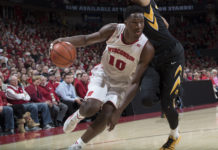Down in Lakeland, Fla., the boys of summer actually start arriving prior to the onset of spring and have been doing so since 1934.
Save for three seasons during World War II, when the team played its spring ball in Evansville, Ind., Lakeland has been the spring training home for the Detroit Tigers. It is a relationship that’s in its 76th season, the longest between a major league team and a spring training city.
Tigers fans from across the country flock to “Tiger Town” each spring to take in the historic atmosphere surrounding Joker Marchant Stadium in Lakeland.
“Every day, you come across people that this has been something they’ve wanted to do their whole life, is come to Joker Marchant Stadium and see a game, or come to Tiger Town and just see it,” said Ron Myers, the Tigers’ director of Lakeland operations, who started as an intern with the organization in 1981.
“The exciting part is to see how many people know about this place, and it’s always been on their list of things to do. Once they see it, they feel it, they experience it, you can see the smile on their face, and I think any time I see that, it just makes you feel pretty special.”
‘Smokeless factory’
In Lakeland, the Tigers represent more than just a professional baseball team to check out each spring. Since Detroit first started playing spring ball at Henley Field in 1934, the organization has became a fixture in the community.
“We’re a smokeless factory in the community,” Myers said. “And our job is to produce Major League players.”
“The real magic, I think, to the Lakeland and Detroit relationship has been the longevity,” said Bill Tinsley, who serves as liaison to the Tigers and manager of community resources development for Lakeland. “Jim Campbell as the [former] president and CEO for the organization had a great relationship with the parks and recreation department and other city officials.”
Tinsley has worked for the City of Lakeland since 1971 and became the city’s parks and recreation director in 1993 prior to his current position. With more than 40 years of experience, he has seen the relationship between lakeland and the Tigers grow into what it is today.
“The Tigers have been engaged in the community since their inception here, or their first arrival here, back in the days when they came in on a train,” Tinsley said. “The chamber of commerce and the city have recognized their value to the community and the contributions here. They used to meet them at the train and carry their bags to the hotel downtown that they stayed in back in the early years.”
As times have changed and baseball has evolved during the past century, so has Detroit’s relationship with Lakeland. What used to be an eight-week spring training process is now
a yearlong courtship between the city and the Tigers.
“Now, 12 months out of the year the Tigers have a presence in the community with operations and activities that are going on,” Tinsley said. “They’re engaged, and the facility operates as a great sports revenue source. We call it our ‘smokeless factory,’ if you will, in that there is a tourism element that is 12 months out of the year with teams coming in and everything from college to high school to amateur sports, pro sports and activities that are going on that the Tigers are playing host to.”
Mutual respect
The common thread between Lakeland and the Tigers in their 76 seasons together is a mutual respect for the other.
“It’s just something that if we all walked in the same room together, if nobody had a logo on, you wouldn’t know who worked for the City of Lakeland or the Detroit Tigers,” Myers said. “It’s an all for one, one for all. It’s a relationship that’s very hard to describe because it’s so good.”
For Tinsley, that level of respect for the Detroit organization grew from the way the Tigers front office has treated city officials.
“Dave Dombrowski, Al [Avila] — these are folks that treat us as partners and equals, not as in service to them,” Tinsley said. “There is a reasonableness that’s brought to our relationship, an understanding of the economics that we have.”
According to Tinsley, all the facilities in the state of Florida are managed, run and owned by either municipal or county government, except for those operated by Disney.
The Tigers, he said, have brought a give-and-take nature to their relationship with Lakeland and stay true to their word.
“If you’re looking for what really is the key to the sustainability of an organization, it’s having excellent business people that whatever they say, you can take it to the bank,” Tinsley said. “And that’s the open, honest relationship we’ve had from the Tiger organization, from the owner down to the people in the front office.”
That mutual respect at the top has had a trickledown effect on the many players Myers and Tinsley have seen over the years, including Toledo’s 2011 Pitcher of the Year Duane Below.
“From here in Lakeland to every level, everybody’s been great,” Below told Toledo Free Press from Lakeland, where he was spring training with the Tigers.
A native of Britton, Mich., Below was drafted by Detroit in 2006 and has worked his way up the ranks of the organization, from single-A ball to competing for a spot in the rotation with the Tigers.
“They want you to succeed,” Below said. “They help you in any way they can, and I think that goes a long way to say for Mr. Ilitch, in hiring the staff that he has.”
Michael Ilitch owns the Detroit Tigers as well as the Detroit Red Wings.
Lakeland has been such a special place that several Detroit players either keep a residence there or call it home, including star pitcher Justin Verlander.
“These guys learn to love this city because quality of life has always been important in our city,” Tinsley said. “No small part is the contribution that’s made by the Tigers’ residence here.”
The early years since the time Clare “Doc” Henley and the Lakeland Chamber of Commerce approached the Tigers in 1933 about making the city their spring training destination, making the Detroit organization and its players feel at home has been a priority for the city and its parks and recreation department, which maintains the Tiger Town facilities.
“Our Parks and Recreation Department, we’re so proud of them,” Tinsley said. “They do have almost a sinful pride in the complex, in its history. I don’t think you can plan well without taking a good look back.”
Detroit’s early years in Lakeland were spent at Henley Field, a 1,000-seat ballpark which saw the likes of Al Kaline, Ty Cobb, Babe Ruth and Ted Williams in its heyday. It was added to the National Register of Historic Places in 1997 and is still used by Florida Southern College and Lakeland High school.
In 1966, the Tigers began playing at their current spring training home, Joker Marchant Stadium, named after Lakeland’s former Parks and Recreation director Marcus Thigpen Marchant, who went by “Joker” and played a vital role in making sure Detroit was taken care of in Lakeland.
With an original seating capacity of 4,900, Joker Marchant stadium has undergone several expansion and renovation projects to bring the ballpark up to date. Including the estimated 1,000 lawn seats on the berm, the stadium now has an approximate capacity of 9,000.
“The city has just been great in bending over backward to make sure that our facilities don’t take a backseat to anybody, even though our age is a lot more than some of the newer complexes being built,” Myers said.
Among the criteria discussed when considering any upgrades to Joker Marchant Stadium and Tiger Town are player development and fan enhancement, the latter of which was brought to the table by Tigers’ President and General Manager Dave Dombrowski, Tinsley said.
“Our leadership has been able to focus on the big picture and view and recognize that $35 to $40 million of economic impact — our stimulus that comes from having a Major League team spring train in your city — are real dollars that are vested into your community,” Tinsley said.
Development of Tiger Town started in the 1950s at the location where the Lodwick School of Aeronautics and Lakeland Municipal Airport once stood. sprawled across 85 acres and home to both the Tigers and their Class-A advanced affiliate, the Lakeland Flying Tigers, Tiger Town features a three-story dormitory, cafeteria, recreation hall and administrative building, making it both a historically unique and comfortable facility for players.
“The city officials, the city manager Doug Thomas, going all the way back throughout the years the city has been a great supporter of ours,” Myers said. “They understand what a great relationship this is, along with the county. So we have a city, the county, that are these great backers of our organization. It’s just been a great relationship all the way around.”
Keeping it going
Neither party sees the historic relationship between Lakeland and the Tigers ending in the foreseeable future.
“I was not in every discussion that’s taken place over the 76 years, but I can tell you the relationship between the Detroit Tigers and the City of Lakeland and Polk County would be hard to be replaced,” Myers said.
The team’s current contract with Lakeland expires in 2016, but Tinsley said he doesn’t think anybody on either side wants the relationship broken.
“The way that you do that and keep that from happening is keep surprises out of the relationship,” Tinsley said. “Open, honest communication exists, and then future planning to anticipate needs before they become emergency needs that can’t be taken care of. so we’re always looking at ‘How are we going to improve ourselves and make ourselves better and stay on top?’”
Not to mention he and Myers have had a lot of fun at their respective jobs over the years.
Myers, who grew up in Michigan with a college baseball coach for a father, has had baseball in his blood since he was a batboy for his dad.
He has cherished the opportunity to work with the many players he’s seen over the years, including Verlander, Below, the longest-tenured Tiger and fan favorite Brandon Inge and Michigan native John Smoltz.
“There’s too many to name,” Myers said of memories created over the years. “Every day, I consider it a blessing. I’ve had a great career. I enjoy what I do. I mean, I could go for days as far as [memories go], and I’d leave one out and that would probably be better than the next one. I’m very grateful, and I’m very lucky to have the position that I have.”
Tinsley, meanwhile, has formed friendships with many Tigers over the years and has taken great pride in showing them what Florida has to offer, from fishing and wild hog hunting to catching an alligator with Bo Schembechler’s son.
“I will tell you I love the people that I’ve met and have learned to appreciate that although they are big celebrities on the national front, many of these folks one-on-one, they’re good people,” Tinsley said. “I’ve just met so many quality people through that relationship that it’s just been a gift to me.
“I hit the job lotto 42 years ago.”
























